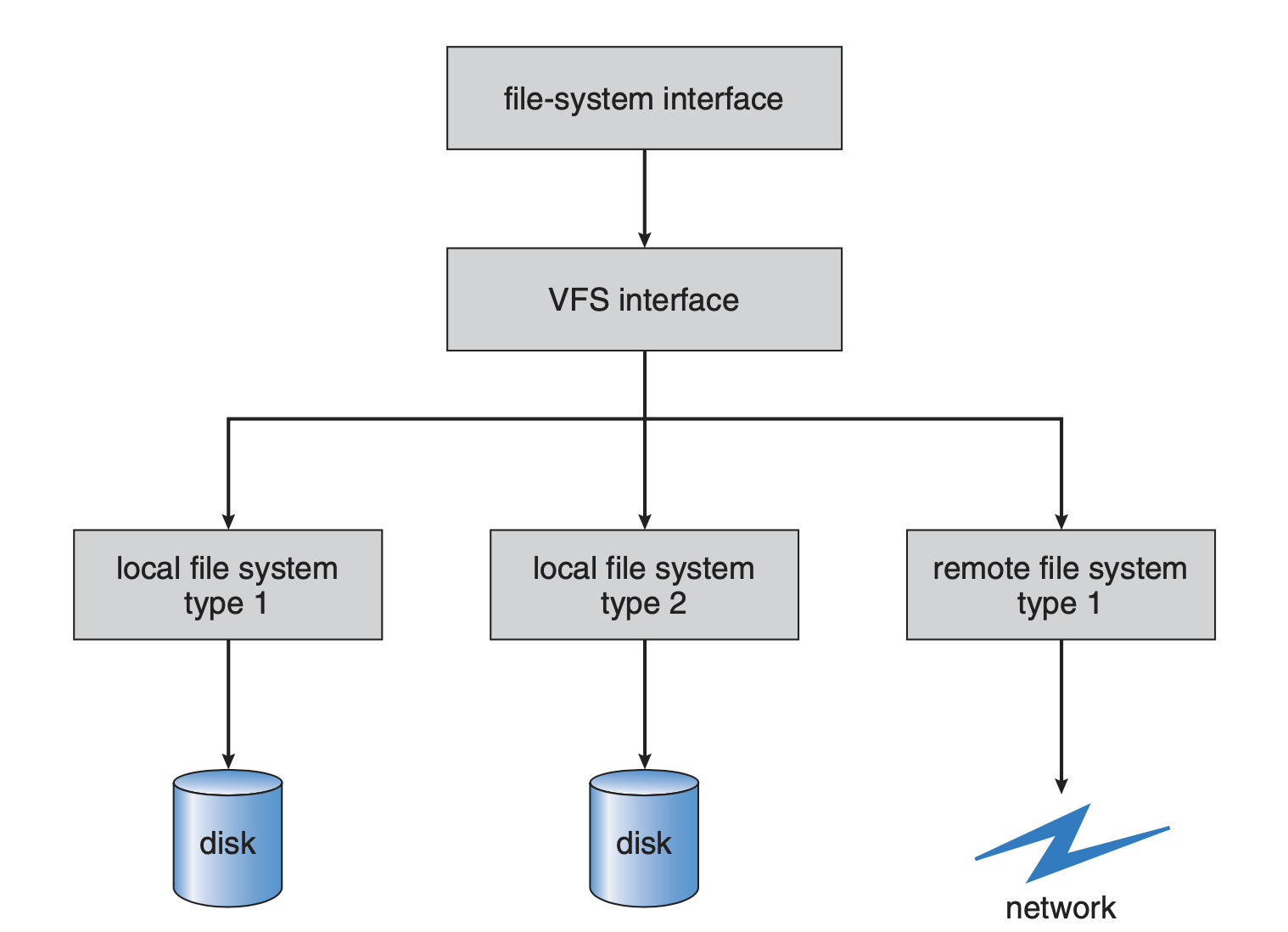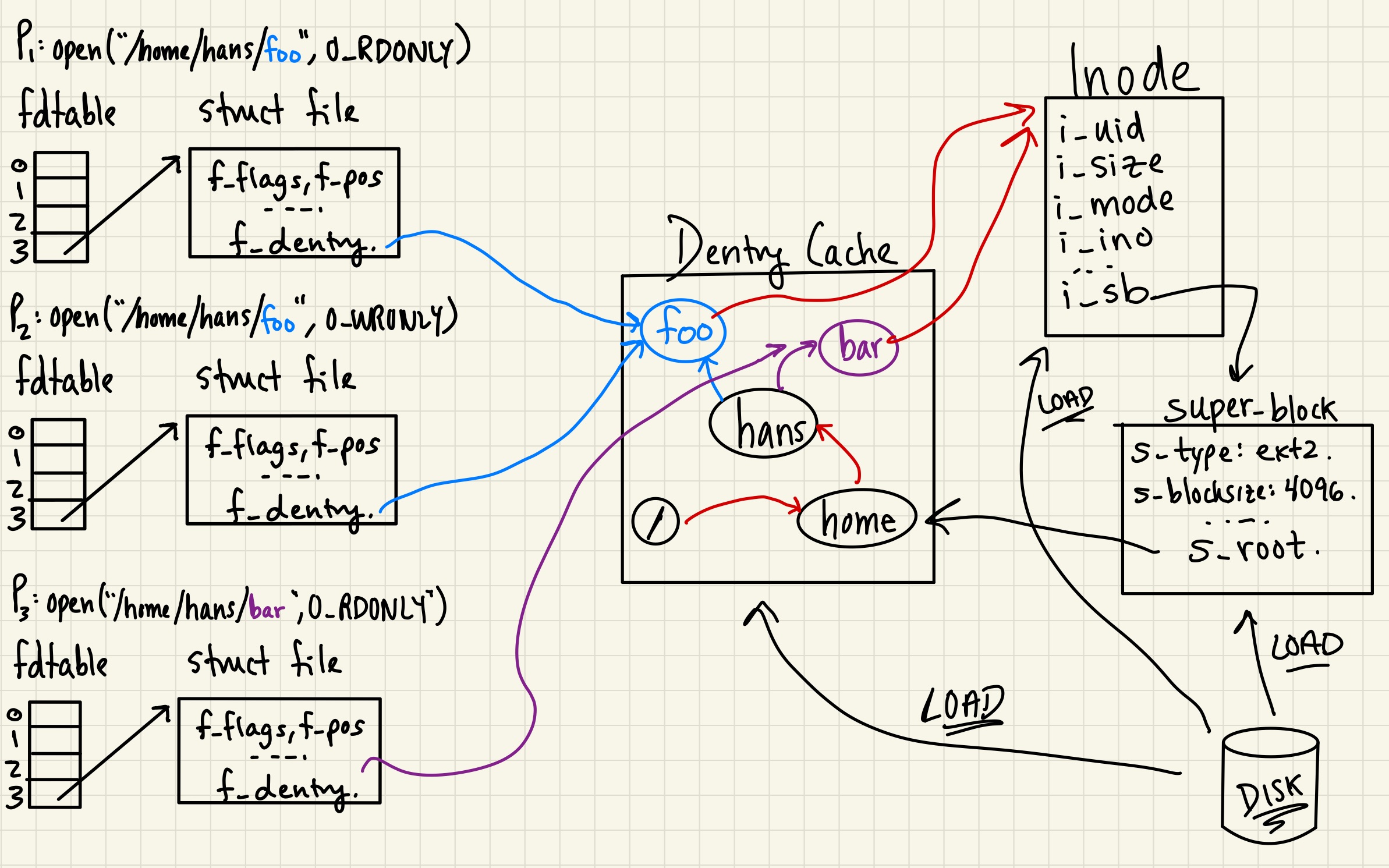COMS W4118 Operating Systems I
Linux File System Architecture
Virtual File System (VFS) Overview

Many file system types and device types can coexist on the same system. How can we unify them all under one uniform interface? Let’s consider three levels of the storage schematic presented above:
- File System Interface
- VFS Interface
- Storage Level
File System Interface
This is the API that userspace programs use to interact with files. Recall file
I/O syscalls from L03-file-io: open(), close(), read(), etc. Userspace
programs receive file descriptor from the kernel and uses syscalls to interact
with the file.
Prefer to give userspace programs a simple and unified interface instead of exposing implementation details! As such, delegate fs-specific details to the kernel.
Storage Level
We’ve learned about several file systems at this point: FFS, ext2, ext3, lfs, reiserfs, etc. We can format (or partition) a storage device (HDD/SSD/etc.) with a file system.
There are even distributed file systems where data is not stored locally, but on some remote server!
However, we don’t want to burden userspace programs with fs-specific details. We need to hook into the kernel so that userspace programs can simply use the unified syscall API!
VFS Interface
An FS abstraction layer that transparently and uniformly supports multiple file systems. VFS specifies an interface that a given FS implements to hook into the kernel
- interface: a struct of function pointers, like
struct sched_classfrom HW6
VFS carries out file I/O operations from userspace by dispatching operations to the FS implementation of the VFS interface
- dispatch example, just call the function pointer:
dir->inode_op->mkdir()
VFS Data Structures
Four high-level VFS data structures: struct file, struct dentry, struct inode, struct super_block.
struct file
Recall from L03-file-io/HW4: struct file represents an instance of an open
file.
- Pointed to by per-process fdtable entry, allows for file sharing by copying
pointer (e.g.,
dup()) - Stores flags, current file position, etc.
- Refers to dentry via
struct path f_path(which refers to inode)
VFS interface: struct file_operations *f_op
- read, write, seek, etc.
struct dentry
Basically a “hard link”: contains name of link and inode number.
Break up an absolute path into dentries, one per component. For example:
/home/hans/foo:
/homehansfoo
Path resolution is expensive! To open /home/hans/foo you need to:
- consult the dentry for
/to find the root inode - find the root data block, iterate through it to find dentry for
home - consult the dentry for
hometo find the inode - find the corresponding data block, iterate through it to find dentry for
hans - consult the dentry
hansto find the inode - find the corresponding data block, iterate through to find the dentry for
foo - consult the dentry
footo find the inode - find the corresponding data block, and finally read the file contents!
Linux employs some cool caching to help improve performance… more on this later.
VFS interface: const struct dentry_operations *d_op
- manage dentries through dentry cache (create/remove/hash/etc), more on this later.
struct inode
Unique descriptor of a file or directory
- Recall discussion of hard links in L24-unix-fs
i_ino: inode # unique per mounted filesystem
Can refer to fs-specific data via i_private (will be used for HW8)
VFS interface: const struct inode_operations *i_op
- create, link, unlink, mkdir, rmdir, etc.
struct super_block
Descriptor of a mounted filesystem.
VFS interface: const struct super_operations *s_op
- inode management, journaling, syncing metadata
Dentry Cache
Linux kernel makes path resolution efficient by employing a dentry cache (dcache).
 (simplified version from this online book)
(simplified version from this online book)
- Mount an instance of
ext2at/homes_rootfield ofsuper_blockrefers to root dentry of the mount
- P1 opens
"/home/hans/foo"for reading- Recall path resultion above: need to read several inodes/dentries from disk
- Along the way, cache them in the dcache
- P2 opens
"/home/hans/foo"for writing- Different
struct filebecause P2 is an independent process - Same dentry and same inode
- Before consulting directory data blocks for dentries, check if present in dcache! Speeds up path resolution!
- Different
- P3 opens
"/home/hans/bar"- Different file than P1 and P2
/home/hans/path resolution cached in dcache- Need to read in
hans/directory data block to find dentry forbar - …only to find it refers to the same inode as
foo barandfooare hard links to the same inode!
Last updated: 2023-04-18